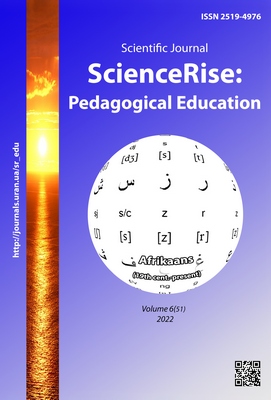Formation of the information culture of teachers in the conditions of military institutions of higher education
DOI:
https://doi.org/10.15587/2519-4984.2022.268179Keywords:
information culture, teacher, factors, criteria, psychological aspects, cadets, military institutions of higher education, project-reflexive approachAbstract
This article presents the methodological principles of forming the information culture of teachers in the conditions of military institutions of higher education. The practical result of the scientific research of the article was the system of recommendations to the management of the military institution of higher education regarding the formation of the information culture of teachers in the conditions of military institutions of higher education. The article systematizes the key problems of improving the information behavior of teachers in military institutions of higher education. The article considers the internal and external factors of formation of the information culture of teachers of military institutions of higher education. The article emphasizes that the information culture of the teacher, as a systematized set of knowledge, skills and abilities that ensure the optimal implementation of individual information activities, aimed at meeting both professional and non-professional needs, is a multilevel system that develops over time. The essence of information needs of teachers in the conditions of military institutions of higher education is considered in the work. Particular attention in this study is focused on the fact that today in Ukraine there is no state concept of information culture. The components of the model of the information culture of a teacher in the conditions of military institutions of higher education are analyzed and considered in detail in the work. The article presents the essence of the concept of pedagogical conditions, which are necessary for designing the learning process in the conditions of military institutions of higher education and which contribute to the development of the information culture of teachers. The basic factors which are necessary for revealing of pedagogical conditions of development of the information culture in the conditions of military establishments of higher education are offered. The main didactic requirements for information technologies of teaching for the formation of the information culture of teachers are considered. The list of criteria for an estimation of a level of formation of the information culture of the teacher in the conditions of military establishments of higher education is offered. The list of organizational and pedagogical conditions in the military institution of higher education, which are necessary for the formation of the information culture of the teacher, is presented. The article presents the key stages of technologies for the formation of the information culture of the teacher. The specifics of the project-reflective approach to the formation of the information culture of teachers and cadets in military institutions of higher education are considered. The scientific result of the research was the proposed methodological principles of forming the information culture of teachers in the conditions of military institutions of higher education
References
- Hrabovskyi Yevhen. (2015). Methods of Assessment and Diagnosis of the Quality of Knowledge in E-Learning. Journal of Communication and Computer, 12 (6), 286–296. doi: https://doi.org/10.17265/1548-7709/2015.06.002
- Losada, J., Raposo, J., Pan, A., Montoto, P., Alvarez, M. (2015). Optimization Techniques to Speed Up the Page Loading in Custom Web Browsers. 2015 IEEE 12th International Conference on E-Business Engineering. Beijing. doi: https://doi.org/10.1109/icebe.2015.12
- Sokolovskyi, S., Naumenko, M. (2018). Analysis of the features information flows management of logistic processes of the units of the National guardian departments of Ukraine. ScienceRise, 2, 19–21. doi: https://doi.org/10.15587/2313-8416.2018.123606
- Diaz, P., Aedo, I., Montero, S. (2005). Web engineering in practice: a development case. Proceedings of the 5th WSEAS International Conference on Distance Learning and Web Engineering. Corfu: IASME, 140–145. Available at: https://www.researchgate.net/publication/242080427_Web_engineering_in_practice_a_development_case
- Hrabovskyi, Y., Fedorchenko, V. (2019). Development of the optimization model of the interface of multimedia edition. EUREKA: Physics and Engineering, 3, 3–12. doi: vhttps://doi.org/10.21303/2461-4262.2019.00902
- Gujari, R., Sahithi, C., Parihar, N. (2020). Academic search engine optimization. Journal of Critical Reviews, 7 (13), 1373–1376. doi: https://doi.org/10.31838/jcr.07.13.227
- Martins, P. V., Zacarias, M. (2017). A Web-based Tool for Business Process Improvement. International Journal of Web Portals, 9 (2), 68–84. doi: https://doi.org/10.4018/ijwp.2017070104
- Hrabovskyi, Y. (2019). Analysis of the use of multimedia components in modern mobile learning technologies. ScienceRise, 4, 46–50. doi: https://doi.org/10.15587/2313-8416.2019.164597
- Rai, P., Lal, A. (2016). Google PageRank Algorithm: Markov Chain Model and Hidden Markov Model. International Journal of Computer Applications, 138 (9), 9–13. doi: https://doi.org/10.5120/ijca2016908942
- Dikiy, A., Butenko, N., Valiavska, N., Naumenko, M., Saiensus, M., Nikitiuk, V. (2020). Formation of System of Logistic Service of the Enterprise in the Conditions of Market Relations. International Journal of Recent Technology and Engineering (IJRTE), 8 (5), 5494–5499. doi: https://doi.org/10.35940/ijrte.e4816.018520
- Bhandari, D. (2017). Improving online visibility of the web pages with Search Engine Optimization. Laurea University of Applied Sciences. Available at https://www.semanticscholar.org/paper/Improving-online-visibility-of-the-web-pages-with-Bhandari/08c6755eefc5eaff2420cfe1c0c9ea587a501129
Downloads
Published
How to Cite
Issue
Section
License
Copyright (c) 2022 Larysa Morozova

This work is licensed under a Creative Commons Attribution 4.0 International License.
Our journal abides by the Creative Commons CC BY copyright rights and permissions for open access journals.
Authors, who are published in this journal, agree to the following conditions:
1. The authors reserve the right to authorship of the work and pass the first publication right of this work to the journal under the terms of a Creative Commons CC BY, which allows others to freely distribute the published research with the obligatory reference to the authors of the original work and the first publication of the work in this journal.
2. The authors have the right to conclude separate supplement agreements that relate to non-exclusive work distribution in the form in which it has been published by the journal (for example, to upload the work to the online storage of the journal or publish it as part of a monograph), provided that the reference to the first publication of the work in this journal is included.







